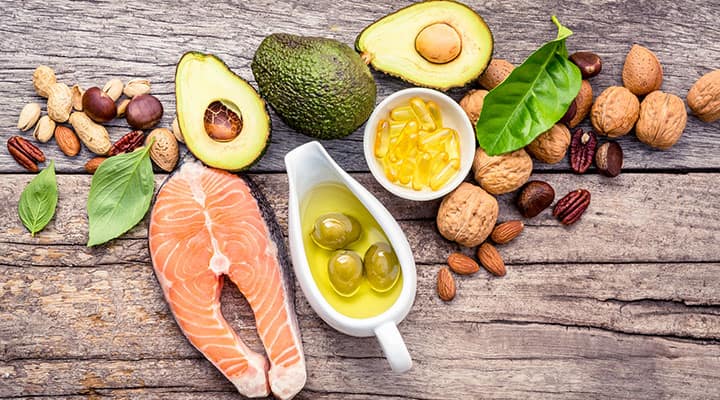Are you getting enough vitamin B? There are more forms of it than you may think! The B vitamins' claim to fame is helping with different aspects of energy metabolism, including breaking down carbohydrates, protein and fat, as well as transporting nutrients throughout the body. But which form of vitamin B does what?
Let's explore the B-complex vitamins and how to get them from food sources, or from a vitamin B-complex , to support your health and energy.
What vitamins are in a vitamin B-complex?
Many people may not realize there are actually eight B vitamins in a B-complex vitamin, all of which are water-soluble—meaning they are not stored in the body and need to be replaced daily.
All B vitamins are involved in metabolism. But each plays its own role in the body. B-complex vitamins are found naturally in a variety of foods, including animal proteins, dairy products, leafy green vegetables and legumes.
The eight B vitamins are sometimes referred to by name instead of number:
- B1 (Thiamine)
- B2 (Riboflavin)
- B3 (Niacin)
- B5 (Pantothenic Acid)
- B6 (Pyridoxine)
- B7 (Biotin)
- B9 (Folate)
- B12 (Cobalamin)
Health benefits of each B vitamin
B1 (Thiamine)
Thiamine plays an important role in energy metabolism and is involved in the functioning of many enzymes associated with breaking down the three macronutrients: carbohydrates, proteins and fat. Thiamine is also important for maintaining a healthy nervous system.
In addition to energy and cardiovascular health, thiamine helps support already-healthy blood sugar metabolism and helps protect the body's tissues against advanced glycation end products and oxidative stress. Thiamine has also been studied for mood and emotional health support.
Foods with thiamine include lentils, green peas, whole grain brown rice and bread, as well as enriched white rice and white bread.
B2 (Riboflavin)
Riboflavin is a key component of two major coenzymes that play a role in several aspects of cellular energy production. Coenzymes are compounds that help other enzymes function. Riboflavin has antioxidant properties and helps the body convert vitamins B6 and B9 into their active forms.
Riboflavin is relatively easy to get through diet alone, which is important, considering riboflavin's role in converting nutrients into energy.
Foods that contain riboflavin include fortified breakfast cereals, dairy products (including milk and cheese), eggs, almonds and salmon.
B3 (Niacin)
All tissues in the body convert absorbed niacin into its main metabolically active form: nicotinamide adenine dinucleotide (NAD). NAD plays a key role in cellular energy production and is needed by more than 400 enzymes to catalyze reactions in the body. One form of niacin, nicotinamide riboside, is a common nutritional supplement. As a precursor to NAD, it is taken to help boost levels of NAD.
Niacin is the B vitamin usually associated with skin flushing, a sometimes uncomfortable but temporary side effect. Some forms of vitamin B3 are designed to help reduce niacin flushing.
You can meet your niacin needs through diet. Niacin-rich foods include protein sources such as chicken, tuna, turkey, salmon and beef.
B5 (Pantothenic Acid)
Pantothenic acid's main function is the synthesis of coenzyme A, which assists in several metabolic pathways and is necessary for the transfer of fats to and from cells. Coenzyme A plays an important role in the citric acid cycle, which is a key step in cellular energy production.
Pantothenic acid is vital to all forms of life. This water-soluble B vitamin is found in almost all animal and plant foods.
B6 (Pyridoxine)
Vitamin B6 and its main bioactive form in the body, pyridoxal 5'-phosphate (PLP or P5P), play important roles in protein and fat metabolism, and they are crucial to the function of more than 100 enzymes. Vitamin B6 is also involved in gluconeogenesis, the formation of glucose from non-carbohydrate sources such as amino acids, the building blocks of proteins.
Dietary sources of pyridoxine include a variety of animal and plant foods, including tuna, salmon, fortified cereals and chickpeas.
B7 (Biotin)
Biotin is often referred to as the beauty vitamin because it plays a role in hair, skin and nail health. (Pro tip: For additional skin health support, take vitamin C.) Biotin is also a cofactor for enzymes involved in the metabolism of fatty acids, glucose and amino acids, the building blocks of the three macronutrients. As such, biotin plays a key role in maintaining the body's homeostasis and general metabolism, which is important to staying healthy.
Biotin food sources include eggs, salmon, sunflower seeds and sweet potatoes.
B9 (Folate)
While often highlighted in relation to pregnancy and promoting a baby's development, folate is not just for pregnancy—and it isn't just for women. Folate is a generic term referring to both naturally occurring folates in food and folic acid, the synthetic form used in dietary supplements and fortified food. Another form of folate, 5-methyltetrahydrofolate (5-MTHF), is the primary active form of folic acid.
Folate plays a key role in the function and development of the central nervous system. Folate can help support healthy homocysteine levels, which supports heart health. And when taken with zinc, folic acid can encourage a healthy sperm count in men.
Folate food sources include dark green leafy vegetables, beans, peanuts, sunflower seeds, fresh fruits and whole grains.
B12 (Cobalamin)
Vitamin B12 is often highlighted as a nutrient of concern in relation to vegans, as it is a nutrient found almost exclusively in animal foods, including seafood, beef, eggs and dairy products.
This essential, water-soluble vitamin plays a role in folate metabolism and the citric acid cycle, a process that contributes to generating cellular energy. This is where cobalamin gets its energetic reputation.
Vitamin B12 plays other roles as well. It helps in the formation of red blood cells and DNA, it may support healthy nervous system function, and it promotes bone health. Some research suggests that B12 also encourages heart health by helping maintain healthy homocysteine levels in the body.
Fun science fact: vitamin B12 is unique in that it contains cobalt, a trace mineral needed in small amounts.
Is it OK to take vitamin B-complex every day?
B-complex vitamins, when taken as directed on your supplement's nutritional label, are generally recognized as safe for daily intake. However, as with any dietary supplement, you should consult a healthcare provider before incorporating a B-complex vitamin into your routine.
Should I take a B-complex vitamin in the morning or at night?
Many people prefer to take their B-complex vitamin in the morning because B vitamins play a role in energy production and nutrient metabolism. However, they can generally be taken at any time of the day. It is important to follow the instructions on your supplement label or follow the advice of your healthcare provider.
When it comes to a dietary supplement regimen, consistency is key—so take your vitamin B-complex when it is most convenient for you, unless otherwise directed. Taking it with other supplements that provide targeted nutrition for healthy aging may help you remember.







